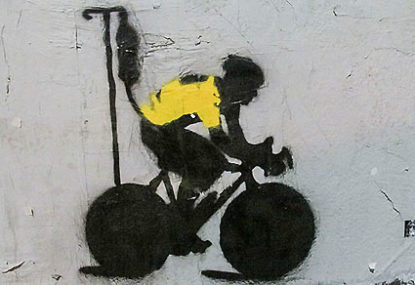'I've just won a stage of the Tour de France, mate!': Hindley grabs yellow jersey as Aussie blows Tour apart
Australia's Jai Hindley has said he is "lost for words" after a shock stage victory at the Tour de France earned him the leader's…

The cheater generally knows that he is cheating. No matter how warped the mind of the liar or the charlatan, he is usually aware that he is doing wrong.
Only the truly pathological are able to convince themselves that even though they take extreme measures to avoid detection, that they are actually committing no offence.
Only the sociopath feels no tinge of guilt or remorse when they engage in wrongdoing.
Stripped seven-time Tour de France winner, Lance Armstrong, told Oprah Winfrey that he did not feel he was cheating while he doped throughout almost all his long and successful cycling career.
Even though he found it necessary to bribe and threaten and bully others to keep his secrets he still felt he was doing nothing untoward. Cheating, he explained, is when you scheme to get an unfair advantage over your competitor.
And since everyone was doping he was, as it were, just levelling the playing field. But earlier, he had allowed that there might have been some bikers who didn’t take performance-enhancing drugs.
Was it okay to have an unfair advantage over them?
The reason Armstrong gave for such unscrupulous behaviour is that he wanted to win. He would do anything, he said, in order to win – anything. And according to him, there was no way he could have won the most gruelling athletic competition in the world without doping.
The win-at-all-costs mentality has been much too closely associated with sport, especially sport at the elite-level.
“Winning isn’t everything,” reminded National Football League (NFL) coaching great, Vince Lombardi, “it’s the only thing.”
The second place finisher is hardly remembered. It is only the winner that is praised and feted and handsomely rewarded. Only the winner achieves the fame and fortune and the status of legend. The also-rans are only remembered for the part they played in the winner’s story.
This reality has been more and more with us, and has meant that more and more athletes have been willing, not only to push the bounds of fairness, but also to downright cheat in order to finish first.
It was this mindset that prompted two-time Skate America Champion, Tonya Harding, to conspire with her husband and others to injure Nancy Kerrigan, the person she considered her main rival for the 1994 U.S. Figure Skating Championships and the Winter Olympics that followed.
Barry Bonds was already an all-time great baseball player when he grudgingly witnessed Mark McGwire and Sammy Sosa set the 1998 summer alight with a carnival of slugging never before seen in the great American pastime.
The fans were in a frenzy as both men rushed past Roger Maris’ 61 home-run record that stood since 1961. At the end of the season McGwire was the new record holder with 70 home runs. Sosa was not far behind with 66.
Bonds was clearly miffed by the acclaim and attention directed at McGwire and Sosa, men he considered lesser players than himself.
Resentful, he embarked on a program of “juicing” that saw him upping the record to 73 home runs in 2001 but also embroiled him in never-ending controversy.
Like Armstrong, and others such as disgraced sprinter, Ben Johnson, and Irish swimmer, Michelle Smith, he will live out the rest of his days knowing that many think of his exploits as being dishonestly achieved.
The temptation to cheat in sport is real and considerable. The distance between winning and not winning is wide and is often the difference between stardom and anonymity.
Morals and sportsmanship be damned – winning is all that matters. As long as there are so enormous rewards to be reaped, there will always be those willing to prosper by underhanded means.
Such victories are usually short-lived. In the long run most cheaters get caught. And even if the authorities fail to detect their misdeeds, will they truly be fulfilled by their tainted accomplishments?
Will it not gnaw at their conscience for life, that neither they nor the public really knew how good they were?
Sport, in its purest form, is supposed to engender good character and magnanimity.
It is the corruption of sport that has spawned the narcissistic and devious behaviour we often observe in elite athletes. The exploits of sportsmen should be admired but it ought be realised that they are just as fallible as everyone else.
The lesson of Lance Armstrong should be that top athletes are not more heroic than the rest of us. They are just better at games. Sports, even at the highest level, are merely people at play.